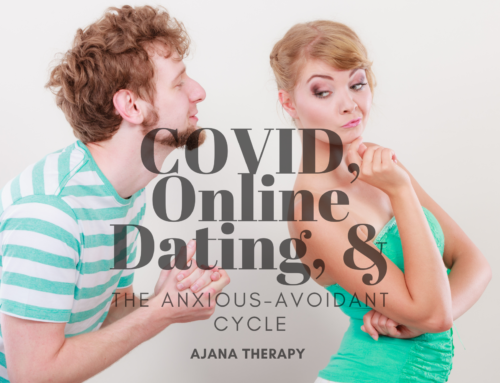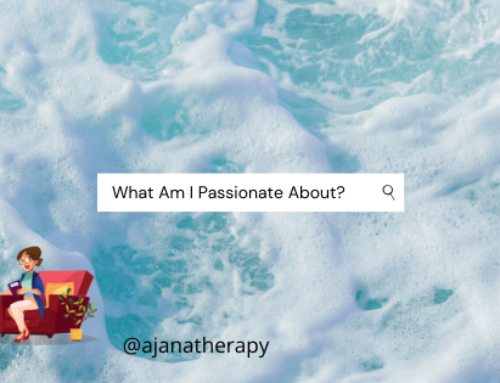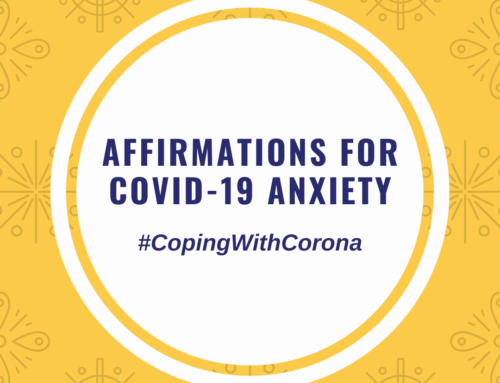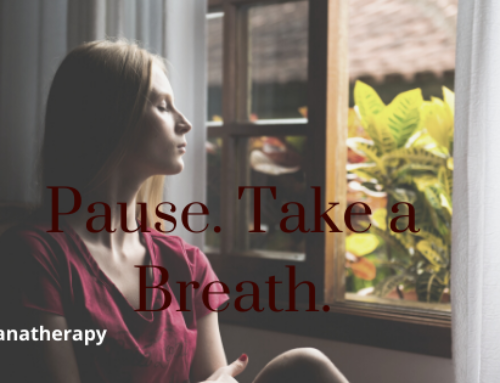Who is this New Houston Counseling Group in Montrose?
For our first blog we are interviewing the owner/founder and clinical director of Ajana Therapy & Clinical Services, Jessica Eiseman, MS, LPC-S, NCC, CCTP. This is a mental health counseling practice in Houston, Texas. Jessica is a Board Approved Supervisor, a Board Certified Counselor, a Certified Clinical Trauma Professional and a Certified Supervisor Trainer. Below we discuss the path that led her to create Ajana Therapy & Clinical Services, what makes Ajana Therapy unique, and some thoughts on finding a therapist!
Written By: SJ Knowlton, Master’s level counseling graduate student
Q: Let’s start with the obvious…why name your practice Ajana?
A: I was watching a random tv show that no longer exists, and I was in a weird place in my career. I was transitioning out of what I thought was going to be my job for a while and trying to figure out what the next steps were. I heard this quote on the show that said, “Never fear the ajana, for that is where the good stuff is.” It was something that I wrote down in that moment and it stuck with me. And so, when I finally decided to go into private practice, it was the name that came to me. I looked up what “ajana” was in Bengali and found out that it means the unknown, being uncertain. And that’s very much where I felt I was. I think that resonates with a lot of people because what brings people to therapy is the uncertainty, the unknown; and sitting in that and recognizing that there are good changes, positive ones that can come after that.
Q: What inspired you to start Ajana?
A: Honestly, one of the big reasons, there were a couple…but the first one is I had transitioned into working for the dark side, aka the insurance company. [laughs] And I knew I was going to love it or hate it and I ended up hating it. But I made that change to make more time for the family I was starting. I quickly realized that it wasn’t what I wanted to do. Everyone kept telling me to go into private practice. What’s funny is the interns I had at the time would say I was anti-private practice, but that’s not the case. It was that I didn’t have the best experience when I worked in it as an intern so it skewed my view a bit. However, the one thing that kept me centered and grounded during that time when I didn’t like my job was actually the interns I had. I started to realize through their not great experiences as well, that there need to be more opportunities for interns and grad students to have a safe environment to learn clinical skills in. And I wanted to give those opportunities to them and our community.
I ended up renting a space and the interns started seeing clients in private practice before I did. I wanted to support them in that way while I monitored them and supervised them. And it grew faster than I could keep up. I found the space we’re in now and I went in knowing I didn’t want to work in a place without windows because I did that for 10 years. I wanted light and space and this place felt very comfortable…I rented earlier than I planned and went from there. Everything just kept growing.
Q: How do you think it’s different from other choices clients have in the mental health field?
A: What I’ve tried to do in conjunction with making this practice is to create a teaching practice—and a very community based one. We give back to the community by providing various pricing levels for individuals who might not be able to go to therapy. Because we are a teaching practice, our interns and graduate students are able to see people at a more affordable cost without using insurance.
I’d also say we don’t feel hierarchal in the sense we’re human just like our clients. We have our flaws and we try to make it a comforting space we would want to come to therapy in. It’s very approachable and in addition to the different pricing options we offer teletherapy as well, which is growing in the field right now, and not everyone offers it. Plus, we’re in the heart of Montrose…this is an area with a big continuing need and there’s not as many clinicians serving this area. We’re a huge supporter of the LGBTQ+ community and we’re very open about being an inclusive practice.
Q: What is your background?
A: I have a Bachelor’s degree in psychology from the University of Houston, go Coogs! Go Lizzo! [laughs] I didn’t know what I wanted to do with myself after undergrad. I started working for The Council on Recovery and was doing social skills classes for low income kids in middle school. I did six-week courses on life skills, communication, drugs and alcohol—that sort of stuff. While I was doing that I started to notice that as much as the kids hated being taken out of gym they ended up not wanting to leave my class. The six weeks would end and while I was calling roll with the new group a kid from the old group would sneak in and I would have to be like, “Go to gym!” And a lot of kids said they wanted to go home with me. They were living in bad situations…something about that sparked me to want to do more. I’ve always been authentic and caring in nature. I thought maybe I’d get a LMFT degree (licensed marriage and family therapist) but it didn’t resonate. Finally, someone said to look into counseling and when I read the program description on UH Clearlake’s website I thought it was a great fit.
By that time I was doing research at Baylor with individuals with schizophrenia and that led to more research while I was in grad school. I worked doing FMRI brain scan research for veterans with PTSD. A lot of my work has been in communities with low-income populations. I’ve seen people from all backgrounds and walks of life. Diversity is important, and I think when we are able to give a wider range of price points for therapy, then we are able to see variety of individuals. And at some point, immigration evaluations came in the picture as well and became a huge part of what I enjoy doing. With these types of evaluations, it really comes down to someone’s life or death. What greater of an impact can you have on someone’s life?
Q: Do you think your experience has helped prepare you for what you face in Ajana? How?
A: I do. You know I think especially working within a clinic setting for so long has given me an advantage. I had to set limited time and saw whatever walked in the door that day and that gave me a wide variety of experiences. I was also thrown into doing assessments when doing clinical research stuff and that gave me a really good grasp on assessment and diagnosing. And just being in the field for almost ten years…I feel I’m equipped to handle most things. And if not, I have a great team that can support any area that I’m not an expert in.
Q: What sort of therapy do you practice?
A: I would describe it as person-centered…you know for me the relationship is something that is very important in creating change in individuals. I think people like to throw around the world “eclectic”, but in this case I believe I am. I’m able to use a variety of tools and techniques. A huge part of what I do is also solution focused and CBT—helping people with pain points and moving them forward more quickly.
Q: What sort of clients do you see?
A: That’s a hard question because I’ve seen the spectrum of things throughout the years. It’s hard to hone in on a niche…but I think what I work best with are clients who are in a time of transition and those who have depression or anxiety. I work really well with chronic depression and of course trauma has also been a huge portion of the work I’ve done. Many issues start with the traumas we’ve experienced throughout our lives. Additionally, since having my daughter a few years ago, it’s sparked an interest in me regarding maternal mental health and realizing how moms are not served necessarily in medical or mental health in the way they should be. So I’m working toward being more knowledgeable in that area. And we do have a variety of clinicians that can meet anyone’s needs. We’re pretty diverse in what we see and what we treat and even how we treat it.
Q: What advice would you give those seeking out therapy?
A: Just do it! [laughs] I’ve always said the world would be a better place if we all had a therapist and I’m biased in that. But we’re not as scary as people think we are, you know? And at this point in my career there’s nothing anyone could say that could surprise me. We all have our stuff. Everybody deals with something and how we choose to deal with it is what makes the difference. I think it helps that there’s less of a stigma at this point, more people are talking about their therapists and there are even therapist memes now (which I’m a huge fan of!). I would tell people to ask a lot of questions…you’re the person in charge of your own therapy. So, don’t be afraid to go see a few different ones and decide which one is the best for you. It doesn’t mean they’re bad or there’s something wrong with you if you don’t click. It’s just about who you jive with. There’s a lot of us out there so if you’ve had a bad experience, I think it’s worth giving it another try.
To schedule an appointment with Jessica, or any of Ajana’s other highly qualified counselors, here or call 832-387-5735.




